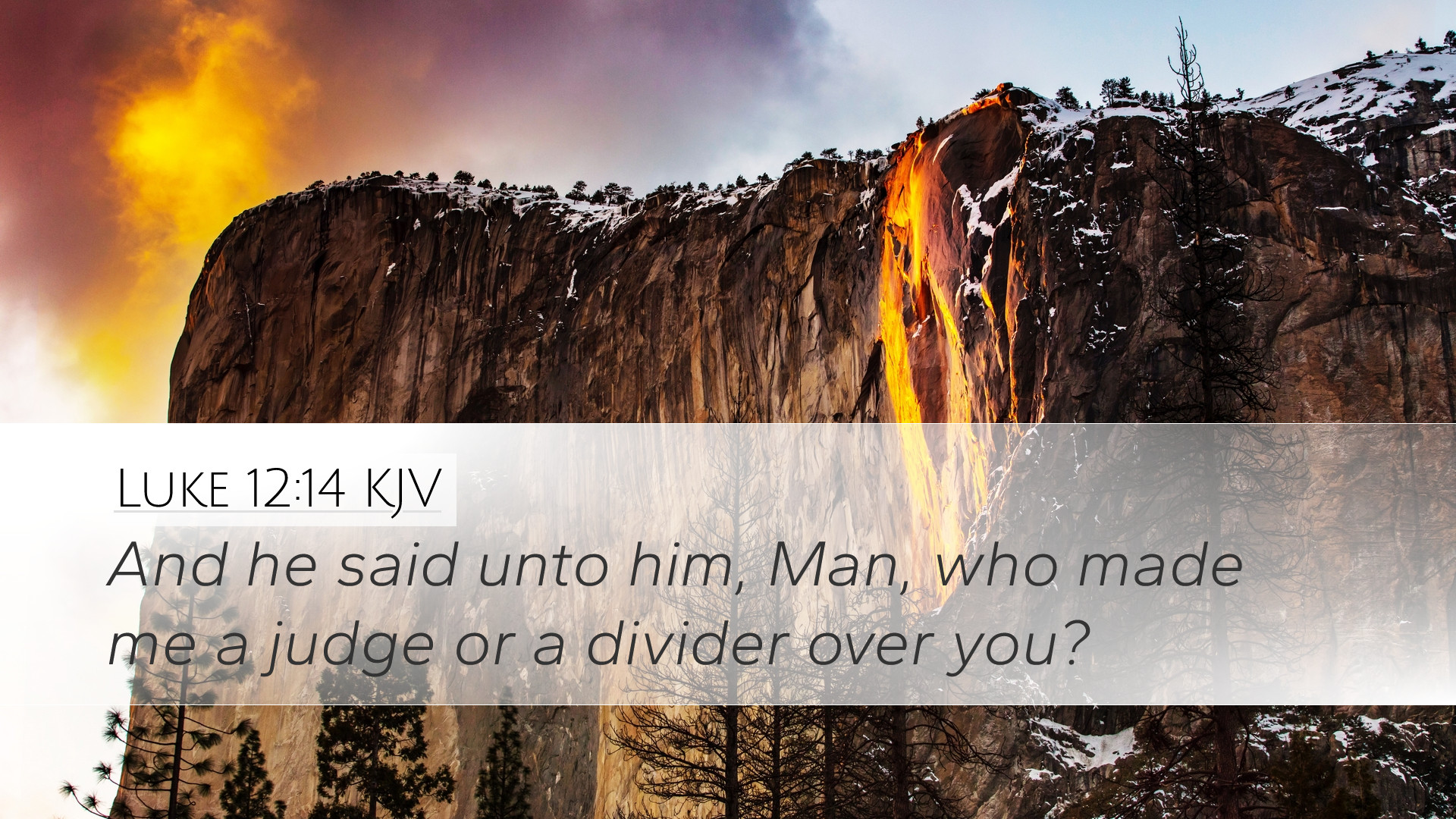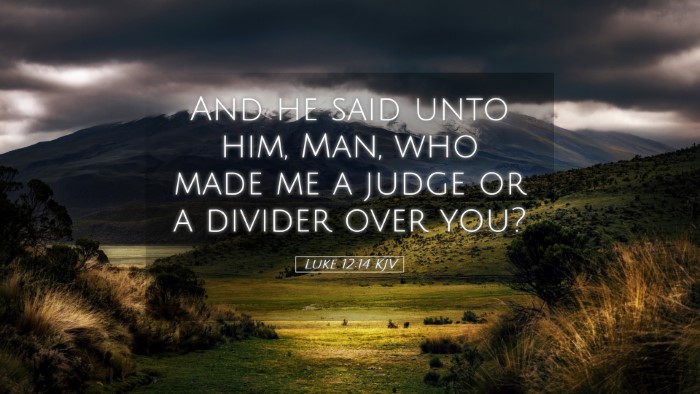Commentary on Luke 12:14
Verse: "But he said unto him, Man, who made me a judge or a divider over you?" (Luke 12:14, KJV)
Introduction
This passage from the Gospel of Luke presents a profound moment where Jesus refuses to be drawn into a dispute over inheritance. The context surrounding this statement is significant, as it highlights themes of materialism, the nature of true justice, and the kingdom of God. In this commentary, we explore insights from esteemed public domain commentaries to illuminate this verse's richness.
Contextual Analysis
In the verses leading up to this statement, Jesus is addressing a crowd and teaching them about the importance of being vigilant and prioritizing spiritual wealth over material possessions. A man in the crowd interrupts Jesus, seeking a distribution of inheritance. This interruption provides the backdrop for Jesus’ response, which exhibits both wisdom and authority.
Matthew Henry’s Perspective
Matthew Henry, in his commentary, emphasizes that this incident showcases the character of Christ, who was a divine teacher rather than a civil judge. Henry points out that the man’s request reflects a common human inclination toward material possessions and division. He notes:
- Desire for Wealth: The man’s plea demonstrates the persistent greed found in humanity, longing for earthly gain rather than spiritual fulfillment.
- Spiritual Prioritization: Jesus redirects the focus from earthly disputes to spiritual matters, asserting that one’s life does not consist in the abundance of possessions.
- Call to Reflection: Henry encourages readers to consider their own hearts; are they focused on divine justice and kingdom values, or are they mired in worldly concerns?
Albert Barnes’ Insights
Albert Barnes expands on the social and cultural implications of the request made to Jesus. He suggests that the request may have been motivated by envy or a desire for equality among siblings. Barnes writes:
- Role of Jesus: Jesus sets boundaries on his earthly role, stating, "who made me a judge or divider," which underscores his mission to bring spiritual salvation rather than to arbitrate material disputes.
- Lessons on Justice: Barnes points out that true justice originates from God, and earthly judgments often fall short of divine righteousness. Thus, believers should seek a higher standard.
- Call to Contentment: Barnes encourages readers to foster contentment, warning against the dangers of greed and the futile pursuit of wealth, as exemplified in the parable following this incident.
Adam Clarke’s Contribution
Adam Clarke brings attention to the broader implications of Jesus’ words. He notes that this encounter may reflect a deeper lesson on human relationships and priorities. Clarke observes:
- Self-Examination: Jesus’ reply invites the question of who truly holds authority in matters of life and death. Clarke encourages the faithful to reflect on their dependence on Christ for true equity.
- Spiritual Arbitration: He emphasizes that while Jesus refrains from judging worldly matters, he still calls individuals to a higher moral and ethical standard. The kingdom of God provides intrinsic value that surpasses material wealth.
- Divine Judgment: Clarke elaborates that God alone is the ultimate judge, and believers should align their lives according to divine principles rather than human standards.
Theological Implications
This verse raises several theological considerations, particularly regarding the nature of Christ and His mission. The refusal of Jesus to engage as a judge over earthly matters signifies a shift in focus toward spiritual rulership. The implications for pastoral care, theological education, and personal discipleship are profound.
Materialism vs. Spirituality
The tension between materialism and spirituality emerges strongly in this verse. As Jesus addresses the crowd, he refocuses their attention on eternal rather than temporal matters.
- Temptation of Greed: Pastors and theologians are reminded to address the cultural temptations that lead congregations toward greed and materialism.
- Call to Stewardship: The passage teaches the importance of stewardship—managing earthly resources in light of divine expectations.
Scriptural Context
Setting Luke 12:14 within the greater narrative of the Gospel highlights a pattern where Jesus consistently redirects focus toward the kingdom of God over earthly concerns.
- Parables of the Kingdom: Following this incident, Jesus shares parables that expand on the themes of wealth, readiness, and divine provision, providing a cohesive understanding of his teachings.
- Kingdom Ethics: The ethical framework established in Jesus' teachings calls for a radical transformation of values among His followers.
Conclusion
Luke 12:14 serves as a pivotal moment in understanding Jesus' ministry and priorities. From the insights gleaned from historical interpreters such as Matthew Henry, Albert Barnes, and Adam Clarke, it becomes evident that Jesus not only offers wisdom to a troubled world but also invites us into a deeper relationship characterized by spiritual understanding and radical discipleship.
As pastors, students, and scholars engage with this text, they are reminded to place their faith in God's justice rather than the flawed systems of the world. By doing so, they align themselves with the values of the kingdom, focusing not on material wealth, but on eternal riches found in Christ.


